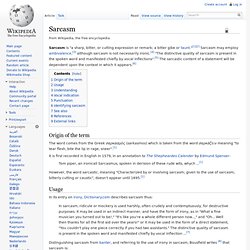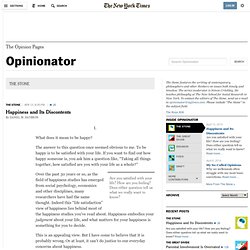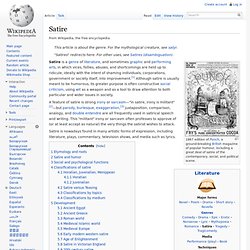

Common English usage misconceptions. Sarcasm. Sarcasm is "a sharp, bitter, or cutting expression or remark; a bitter gibe or taunt.

"[1][2] Sarcasm may employ ambivalence,[3] although sarcasm is not necessarily ironic.[4] "The distinctive quality of sarcasm is present in the spoken word and manifested chiefly by vocal inflections".[5] The sarcastic content of a statement will be dependent upon the context in which it appears.[6] Origin of the term The word comes from the Greek σαρκασμός (sarkasmos) which is taken from the word σαρκάζειν meaning "to tear flesh, bite the lip in rage, sneer".[1] It is first recorded in English in 1579, in an annotation to The Shepheardes Calender by Edmund Spenser: Tom piper, an ironicall Sarcasmus, spoken in derision of these rude wits, whych ...[1] However, the word sarcastic, meaning "Characterized by or involving sarcasm; given to the use of sarcasm; bitterly cutting or caustic", doesn't appear until 1695.[1] Usage In its entry on irony, Dictionary.com describes sarcasm thus: Understanding Vocal indication.
Irony. A stop sign ironically defaced with a plea not to deface stop signs.

Irony (from Ancient Greek εἰρωνεία (eirōneía), meaning "dissimulation, feigned ignorance"[1]), in its broadest sense, is a rhetorical device, literary technique, or event characterized by an incongruity, or contrast, between what the expectations of a situation are and what is really the case, with a third element, that defines that what is really the case is ironic because of the situation that led to it.
The term may be further defined into several categories, among which are: verbal, dramatic, and situational. The 3 Most Common Uses of Irony. THE STONE - Opinionator. This is the second in a series of interviews about religion that I am conducting for The Stone.

The interviewee for this installment is Louise Antony, a professor of philosophy at the University of Massachusetts at Amherst and the editor of the essay collection “Philosophers Without Gods: Meditations on Atheism and the Secular Life.” Gary Gutting: You’ve taken a strong stand as an atheist, so you obviously don’t think there are any good reasons to believe in God. But I imagine there are philosophers whose rational abilities you respect who are theists. How do you explain their disagreement with you?
Are they just not thinking clearly on this topic? Louise Antony: I’m not sure what you mean by saying that I’ve taken a “strong stand as an atheist.” G.G.: That is what I mean. L.A.: O.K. I say ‘there is no God’ with the same confidence I say ‘there are no ghosts’ or ‘there is no magic.’ That’s not to say that I think everything is within the scope of human knowledge. Litotes. In rhetoric, litotes (/ˈlaɪtətiːz/,[1] US /ˈlɪtətiːz/ or /laɪˈtoʊtiːz/) is a figure of speech in which understatement is employed for rhetoric effect,[2] principally via double negatives.[3][4] For example, rather than saying that something is attractive (or even very attractive), one might merely say it is "not unattractive".

The use of litotes is common in English, Russian, German, Dutch and French. They are features of Old English poetry and of the Icelandic sagas and are a means of much stoical restraint.[6] The word litotes is derived from the Greek word litos meaning "plain, small or meager".[7] George Orwell complained about overuse of the 'not un...' construction in his essay "Politics and the English Language". Biblical litotes[edit] Classical litotes[edit] The first time this word is mentioned is in a letter from Cicero in 56 B.C. In Old Norse, there were several types of litotes that got the same point across. Litotes and Ethos[edit] Satire. Satire is a genre of literature, and sometimes graphic and performing arts, in which vices, follies, abuses, and shortcomings are held up to ridicule, ideally with the intent of shaming individuals, corporations, government or society itself, into improvement.

Although satire is usually meant to be humorous, its greater purpose is often constructive social criticism, using wit as a weapon and as a tool to draw attention to both particular and wider issues in society. Satire is nowadays found in many artistic forms of expression, including literature, plays, commentary, television shows, and media such as lyrics. Etymology and roots[edit] The word satire comes from the Latin word satur and the subsequent phrase lanx satura.
Satur meant "full" but the juxtaposition with lanx shifted the meaning to "miscellany or medley": the expression lanx satura literally means "a full dish of various kinds of fruits Satire and humor[edit] Social and psychological functions[edit] Horatian[edit] Examples: